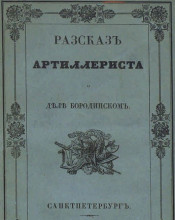
The Battle of Borodino in the spotlight of the Presidential Library
The Battle of Borodino was held 207 years ago, on September 7 (August 26 according to the old style) of 1812. It was not just a major and bloody battle. Borodino was the result of a conflict of two systems, the two largest armies and the most powerful states of its time: France, led by Napoleon, striving for hegemony in Europe, and the Russian Empire, headed by Alexander I, who avoided this war.
The Presidential Library’s portal contains a draft letter of Alexander I to Napoleon I on Russian policy in relation to France, drawn up in May 1812. The Russian emperor wrote: “My feelings, like my politics, have remained unchanged, and I want nothing so much as to avoid a war between us...” The collection “The Patriotic War and its Causes and Consequences” (1912) highlights personal relationships of the two emperors, as well as the balance of power on the eve of the war.
As a result, in June 1812, Napoleon still invaded Russia. And two months later, the commander in chief of the Russian army Mikhail Kutuzov gave the French a general battle at Borodino.
The portal and reading rooms of the Presidential Library provide access to a lot of interesting materials devoted to that time including electronic copies of rare books, photographs of battlefields, radio and TV programs that give an opportunity look back at distant events through the eyes of their participants, digital copies of portraits of the heroes of the war of 1812 provided by the State Hermitage Museum. They form a digital collection "Patriotic War of 1812".
“There were many strategic descriptions of the Battle of Borodino, but the details of participants were hidden, modest Russians are silent and give light to judge their valor”, - wrote N. Lyubenkov, the author of “The Gunner's Tale of the Borodino Affair” in 1837 and decided to fill the gap by speaking on behalf of those same “participants”. “If I incorrectly described it, please, wait for another Borodino affair and believe that justice is with experience, otherwise it will all be a theory that is easier to preach than to be under the kernels, buckshots and with such a passionate enemy as the French”.
The partisan movement happened at that military campaign in Russia for the first time. The merit belongs to the famous partisan poet Denis Davydov (1784–1839).
A few days before the famous battle, Lieutenant Colonel of the Akhtyr Hussar Regiment Davydov visited... his family estate. Few people know, but it was in Borodino that he spent part of his childhood and youth. “On August 21, 1812, in the view of the village of Borodino, where Davydov grew up and where his parental house was hastily dismantled for fortifications, five days before the great battle, Denis Vasilievich offered Bagration the idea of his own partisan detachment”, - says V. V. Gervais "Partisan-poet Denis Davydov" (1913), available in the electronic reading rooms of the Presidential Library.
“Borodino!” - wrote 75 years after the battle, E. Sysoeva and A. Almedingen in the essay “The Battle of Borodino on August 26, 1812”, posted on the Presidential Library’s portal. - Hardly anyone is still alive after the Battle of Borodino! 66 years have passed since Napoleon died out on a rock, a forgotten exile, a stranger to everything... the one who went with two hundred peoples to fight with Russia! The Russian Tsar, blessed by the peoples of Alexander, the sovereign of the great era of the burning of Moscow and the mercy of Paris, also rested in peace. The heroes who fought for their homeland also passed away; but the memory of valiant exploits will live forever, and the tradition will keep alive for posterity the glorious names of those who fell on the battlefield".
The French near Borodino did not succeed in defeating the Russians, but "the losses suffered by both sides were truly terrible. 58 thousand soldiers were killed and wounded from the Russian army, the French lost about 50 thousand. The trophies were the same”, - wrote P. M. Adrianov in the book “The Battle of Borodino” (1912), available in the electronic reading room of the Presidential Library.
By the way, a distinguishing feature of the researchers of that war from both the Russian and French sides is respect for the enemy. Here is how, half a century later, in the book “The Battle of Borodino” (1861), I. P. Liprandi spoke of Napoleon: “In the head of our opponents, in superior numbers against us, stood the genius of his time - a commander with teams hardened in twenty-year victorious battles under private leadership tsars, dukes and other famous persons. In particular, this terrible day (Borodino), or just a few hours of it, is remarkable for the bloodshed and perseverance in mutual attacks, skillfully managed by private superiors".
In addition, the collection “Patriotic War of 1812” includes materials from various Russian sources: the Foreign Policy Archive of the Russian Ministry of Foreign Affairs, the State Hermitage Museum, the Russian State Library and National Library of Russia, as well as foreign sources, such as the Library of Congress.

